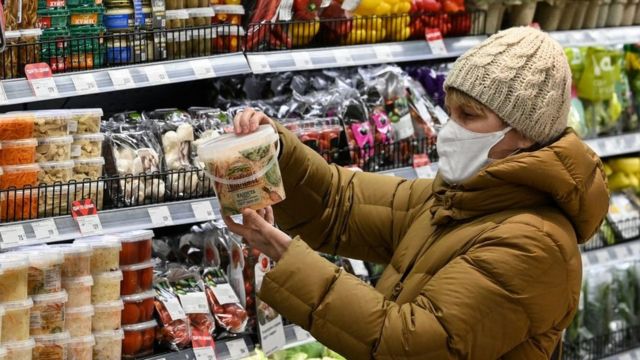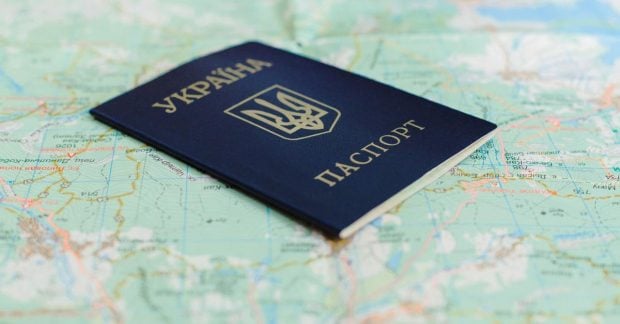- Laura Jones
- Business correspondent, BBC News

Photo by Getty Images
At first glance, Russia has so far been able to avoid an economic collapse after invading Ukraine.
Since February, it has suffered from increasingly severe sanctions imposed by Western countries.
Due to the initial shock in Russia, the stock market was temporarily closed, and people lined up in long queues at ATMs, worried about their savings.
However, thanks to the policy of the Russian central bank, the ruble returned to pre-war levels.
His interventions included limiting the amount of money people could transfer abroad, as well as forcing companies that export goods to convert 80% of their foreign income into Russian currency.
The country has also managed to avoid default on foreign debt.
President Putin has insisted that the West’s “economic blitzkrieg” has failed.
But Elina Rybakova, deputy chief economist at the Institute of International Finance, says these “superficial” figures “don’t matter much in real life.”
Russia’s metallurgical, chemical and automobile companies are already bearing the brunt of sanctions aimed at thwarting President Putin’s military efforts.
A recent survey of more than 13,000 companies by Russia’s central bank found that many had trouble delivering goods such as microchips, car parts, packaging or even buttons.
Shortages of raw materials or spare parts are forcing some companies to temporarily close plants or look for suppliers elsewhere.
Japanese carmaker Toyota, for example, stopped importing cars to Russia and suspended operations at its St. Petersburg plant in March, citing war-related “supply chain disruptions.”
BlueBay Asset Management economist Timothy Ash says sanctions have been much more aggressive than many expected.
“I think the long-term consequences will be devastating,” he told the BBC, adding that “removing Russia from the Western supply chain because it is an unreliable partner” will push the country into recession.
Even the Bank of Russia has acknowledged that because companies are looking for different suppliers, fighting boycotts of shipping companies or not getting the technology they need, the country is facing a period of “reverse industrialization”.
“The reality is that Russia will have limited access to financial markets, lower growth, lower living standards and higher borrowing costs,” Mr Ash added.
Of course, this effect is felt.
Many ordinary Russians, Rybakova says, “live in the gray area,” especially when it comes to employment.
“A lot of people have no idea what will happen … They can still go to restaurants, go to work and still don’t see much change because the companies they work for are still unsure of their future plans,” he said. she.
TV against the refrigerator – how Russians live
Photo by Getty Images
Anastasia Stognei, business correspondent for the Russian service of the BBC
30-year-old Olga is an employee of a Moscow bank. It is trying to maintain its pre-war standard of living, but it is becoming increasingly difficult.
Like many Russians, she has to ask friends living in Europe to pay for Netflix and Spotify after Visa and Mastercard left Russia.
Earlier this month, she booked a holiday ticket to Turkey, one of the few foreign destinations still open to Russians.
Before the war, a plane ticket would have cost her 15,000 rubles ($ 225). Now she had to pay 55,000 rubles ($ 825).
Olga hopes to be able to upgrade her iPhone and MacBook abroad – after all, Apple has also ceased operations in Russia.
For 79-year-old Lyudmila from Voronezh, a city 500 km south of Moscow, essential goods became much more expensive.
“I go to the market once a week. Every time everything gets more expensive. Last time milk went up by five rubles, tomatoes – by 10,” she said.
Dmitry, 33, is a masseur from the small Siberian town of Rubtsovsk. Before the war, he lived well, spending about 300 rubles ($ 4.5) a day. “Sausage, bread, go to the bath with friends once a week,” he says.
Since February 24, when the war began, its costs have jumped by 50%.
Despite economic difficulties, Dmitry supports the war. He says some of his friends are complaining about prices, as well as the fact that no Western blockbusters can be seen in cinemas anymore.
Despite all this, most Russians still strongly support the war. The TV, full of official propaganda, still wins the empty refrigerator.
Symbolic Western brands such as McDonald’s and Levi’s continue to pay salaries to thousands of Russian employees, despite the cessation of operations in the country.
But there are fears that unemployment will rise as hopes that the war will end soon fade.
Moscow Mayor Sergei Sobyanin warned in April that about 200,000 jobs were at stake in the capital alone, while Trading Economics predicts that Russia’s unemployment rate could jump to 7% by 2024.
And there has already been a significant outflow of IT workers and other professionals, which Ash describes as a “brain drain.”
Several consulting companies have removed workers from the country, and reports from Russia’s independent news site Meduza say up to 5,000 Yandex employees have left Russia, with some expressing concern about the technology giant’s censorship of war-related content.
For those who remain, making ends meet is a big challenge.
“There are opinions that Russians are used to difficult conditions, but they have lived in relative prosperity for the last 20 years,” says Ash. “They know what a good life is.”
Photo by Getty Images
Although at the beginning of the war there were reports of shortages of such things as cooking oil, supermarket shelves were reportedly full, but prices have risen.
Many countries are suffering from rising prices due to the pandemic.
But amid shrinking economies and supply chain disruptions, economists expect that inflation, which tracks how the cost of living changes over time, could reach at least 20% in Russia in 2022.
Ash and Rybakova mention friends who can’t get medicine for their heart or thyroid gland, but say the rising cost of living will hit the poorest Russians the hardest.
Putin has promised that pensions and unemployment benefits will increase in line with inflation.
And the Russian government has its own financial lifeline, even with an unprecedented level of sanctions. He can still sell a lot of oil and gas, a key pillar of his economy.
According to the Russian central bank, in the first three months of 2022, Russia exported goods and services by $ 58.2 billion more than it imported, and the amount increased due to rising energy prices.
Despite the US’s announcement of a ban on Russian energy imports, Europe is still unable to agree on how to reduce its dependence on Russian supplies.
Europe gets about 40% of its natural gas from Russia, which is also its main supplier of oil, but some countries are more dependent on Russian fossil fuels than others, so a sudden cut in supplies could have a major economic impact.
“There is no doubt that Europe will have some difficult years to give up Russian oil and gas, but it is much worse for the Russian economy, which will suffer in the long run,” said Ole Hvalbie, an energy analyst at SEB.
Although Russia may have a sufficient financial cushion to provide subsidies to the poorest in the short term, as well as to protect the ruble, Ash says the long-term perspective is more uncertain.
“Whatever happens, whether the oil embargo is imposed in six months or a year … it will be a serious blow to an economy isolated from the West,” he added.
Want to get top news in Messenger? Subscribe to our Telegram or Viber !





